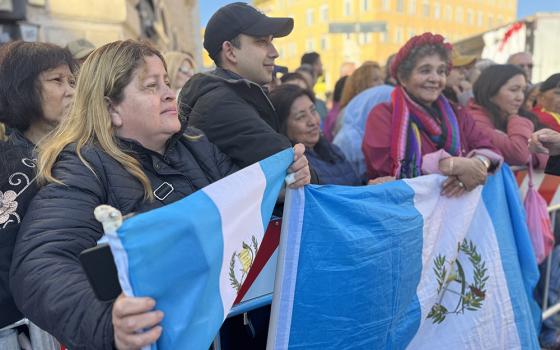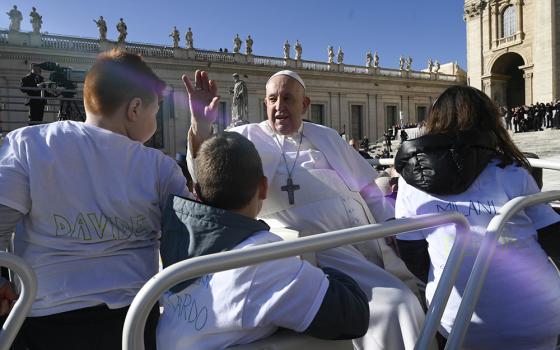Birds fly as the sun sets over the mountains near Assisi, Italy, in this Oct. 26, 2011, file photo. St. Francis, who was born in Assisi in the 12th century, is the patron saint of ecology. (CNS/Paul Haring)
In 2015, someone gave me a copy of Laudato Si' and it changed my life. I was a junior at a public college, majoring in physics and religious studies, and I was the only Christian I knew who cared about climate change.
The people at my Baptist church back home in rural Appalachia — where one grandfather was a preacher and the other worked in the coal mines and then an aluminum plant — loved and supported me, but they mostly thought climate change was overblown. I couldn't understand how they knew more about nature than the suburban and urban friends I had made in college yet didn't treat climate as a serious issue.
My friends in the Baptist campus ministry were more open but still thought of climate as "one of those science topics" that I was interested in and not something that mattered much to their lives or faith. Pope Francis' encyclical was the first time I encountered a Christian leader treating the climate issue as seriously as it deserved, and more importantly, the first time I encountered someone offering diagnoses and solutions from a Christian perspective.
I knew in an abstract sense that Catholicism had an intellectual tradition and many colleges, but I had never seen someone leverage the full wisdom of the Christian tradition and bring it to bear on a pressing modern issue. Pope Francis wasn't just reciting historical fun facts or philosophical trivia; he was using the full moral imagination of the oldest denomination to address one of the great issues of the 21st century.
I didn't know any Catholics until I went to college, and there weren't any Catholic parishes within an hour's drive of where I grew up, so Laudato Si' was my first proper introduction. Over the next few years, when someone invited me to Mass, adoration, a Catholic book club or an adult education session, I said, "Yes," and I found a lot to like.
I loved that the church takes the Eucharist so seriously.
I loved that the church has such a fruitful and thoughtful relationship with art — from the architecture of the Basilica of the Sagrada Familia in Barcelona to the films of Martin Scorsese and the writings of Flannery O'Connor, Graham Greene and Shūsaku Endō.
I loved discovering the monastic tradition and visiting monasteries, where the all-consuming nature of the modern world is tuned out in favor of simplicity and stillness.
I loved reading the Summa Theologiae by St. Thomas Aquinas in graduate school and feeling like I had found some knowledge sturdy enough to build a faith on top of.
The cover of the English edition of Pope Francis' encyclical on the environment, "Laudato Si', on Care for Our Common Home." (OSV/courtesy U.S. Conference of Catholic Bishops)
I loved that the church was truly a global body, one of the few Christian denominations to remain so, and I loved that my parish was home to people who didn't look like me or have the same life experiences I did.
I loved that the church has a confident and open-handed mindset toward science, nurtured by its own famous minds like Gregor Mendel (Augustinian friar and father of genetics) and Georges LeMaitre (Jesuit priest and father of the "Big Bang theory").
I loved that Laudato Si' emphasized the shallow cruelty of the "throwaway culture" that dominates today's individualistic world. Nothing and no one is disposable to God, so why should we allow ourselves to adopt a lower standard?
I have since married a cradle Catholic, converted and baptized my daughter in the church. After working for various Christian environmental organizations in the past, I was thrilled to recently join the Catholic Climate Covenant's new young adult advisory board, where we work to bring the vision of Laudato Si' to life.
Given the climate and environmental crises, Catholicism has much to offer. The problems are global, so the solutions must be global as well. The Catholic Church's position in the global South and West gives it a unique vantage point to reach the many actors necessary for durable climate action. The release of Laudato Si' provides an example by helping spur the passing of the 2015 Paris Agreement, the world's first major climate resolution.
The church also possesses a deep wisdom and vision that can bolster the climate movement. The Black church provided a moral imagination that animated the American Civil Rights Movement in the 1950s and 60s, while Gandhi's Hindu and Christian pacifism led India to independence from the British in the 1930s and 40s. Today's climate movement aspires to the level of success of these previous movements but needs the depth of vision and moral language that the church can provide.
For centuries, Catholic thinkers have pondered how best to establish frameworks for the common good. The climate movement needs slogans, pickets and energy, and it also needs the intellectual depth provided by the many saints and scholars in church history who have written eloquently about how best to balance competing interests of the economy, environment and humanity's health and standard of living.
Climate change is one of the defining issues of the 21st century, driving migration and unrest across the globe in addition to new weather patterns. The church is not perfect, but this moment provides an opportunity for us to fill a crucial leadership vacuum and bring a robust "pro-life for the whole-life" wisdom to the conversation.
It is not too late to steer the crisis toward more human flourishing, both here in the United States and abroad. I pray we will lean into this moment, and I pray you will join me.
Advertisement





